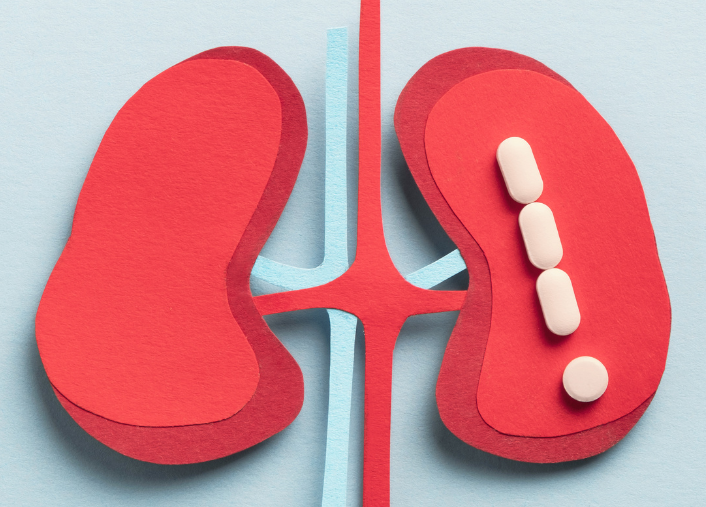
Kidney stones (or nephrolithiasis) are hard deposits of minerals and salts inside the kidneys. They can develop when the concentration of certain substances (such as calcium, oxalate, uric acid, and phosphate) increases in the urine to levels at which these substances no longer dissolve completely.
There are several types of kidney stones, including:

Kidney stones form when your urine contains more crystal-forming substances—such as calcium, oxalate, and uric acid—than the fluid in your urine can dilute. At the same time, your urine may lack substances that prevent crystals from sticking together, creating an ideal environment for kidney stones to form.
Several factors can contribute to the formation of kidney stones, including dehydration, diets high in protein, sodium, and sugars, obesity, specific supplements and medications, and medical conditions like metabolic disorders that increase the concentration of certain substances in urine. Genetic factors can also play a role, making some individuals more predisposed to developing stones than others.
The symptoms of a kidney stone typically become apparent only when the stone moves within the kidney or passes into the ureters, the tubes connecting the kidneys and bladder. Common symptoms include severe pain in the side and back, below the ribs, pain that radiates to the lower abdomen and groin, pain during urination, pink, red, or brown urine, cloudy or foul-smelling urine, nausea, and vomiting, persistent urge to urinate, urinating more often than usual, and fever and chills if an infection is present. The pain caused by kidney stones can change in intensity and location as the stone moves through the urinary tract.
The time it takes to pass a kidney stone varies significantly depending on the size of the stone and its location. Small kidney stones (less than 5mm) can pass within a few days to a few weeks with adequate fluid intake, while larger stones (5mm to 10mm) might take longer and require some form of treatment. Stones more than 10mm rarely pass without a specific medical procedure. The process can be painful; medical intervention may be necessary to aid the passage or remove the stone.
In 2005, the first twin study on kidney stone predisposition involving approximately 7,500 pairs of male twins examined the hereditary roots of this condition. To assess the genetic influence on kidney stone formation, researchers compared the concordance rates of kidney stones between monozygotic (MZ) twins, who share 100% of their genes, and dizygotic (DZ) twins, who share roughly 50% of their genetic material. The study found 39 concordant pairs among MZ twins and 17 concordant pairs among DZ twins for kidney stones, indicating a significantly higher concordance rate in MZ twins (32.4%) than in DZ twins (17.3%). This discrepancy suggests a substantial genetic component to the risk of developing kidney stones, with heritability estimated at 56%.
The CASR gene encodes the calcium-sensing receptor (CaSR), which plays a crucial role in maintaining calcium homeostasis in the human body. It is expressed in the parathyroid glands regulating parathyroid hormone secretion and in the kidneys taking care of calcium reabsorption. Variations in the CASR gene can lead to various calcium-related disorders, affecting bone density, kidney function, and overall metabolic processes.
Research has identified a variant, rs7627468 (A), in the CASR gene to be associated with kidney stones, suggesting it is a potential candidate gene for the condition. Despite its association with kidney stones, rs7627468 showed a non-significant trend affecting serum and ionized calcium levels and 25-hydroxy vitamin D levels. Another variant, rs73186030, significantly linked to serum calcium levels, did not associate with kidney stones, highlighting the complex genetics underlying calcium regulation and formation.
The AQP1 gene encodes for aquaporin-1, a protein that functions as a water channel across cell membranes, particularly in the kidney. It plays a vital role in regulating water balance and osmolarity in the body by facilitating water transport in the kidneys, which is crucial for urine concentration and maintaining fluid balance. Variations in the AQP1 gene can impact kidney function and water homeostasis.
The SNP rs1000597, located near the FAM188B/MINDY4 and AQP1 genes, is significantly associated with kidney stones. AQP1, crucial for the urinary concentration process, and a novel protein encoded by ENST00000434909, expressed in the kidney and potentially impacting urine concentration, are implicated. rs1000597’s genomic location suggests a role in regulating these genes’ expression, influencing nephrolithiasis risk.
A 2015 GWAS utilized whole-genome sequencing of 2,636 Icelanders to analyze 28.3 million sequence variants, which was further applied to a larger group of 5,419 individuals with kidney stones. significant genetic variants linked to kidney stone risk were discovered, including notable ones in the ALPL and CASR genes. Special attention was given to coding sequence variants, identifying two rare variants in SLC34A1 and TRPV5 genes associated with recurrent stones. This research enhances our understanding of kidney stone genetics, suggesting directions for future diagnostics and treatments based on genetic insights.
Preventing kidney stones involves lifestyle and dietary changes. Staying well-hydrated is crucial; drinking enough water to produce at least 2.5 liters of urine daily is recommended. Limiting salt and animal protein intake can also reduce the risk of some stones.
Depending on the stone’s nature, a doctor might advise limiting foods rich in oxalates (such as spinach, rhubarb, and almonds) or taking supplements like potassium citrate to increase urine citrate levels, which can help prevent the formation of stones.
Regular check-ups and specific dietary recommendations based on the type of stones previously formed can also be part of a prevention strategy.
*Understanding your genetics can offer valuable insights into your well-being, but it is not deterministic. Your traits can be influenced by the complex interplay involving nature, lifestyle, family history, and others.
Our reports and suggestions do not diagnose or treat any health conditions or provide any medical advice. Consult with a healthcare professional before making any major lifestyle changes or if you have any other concerns about your results.


